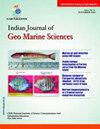The cytotoxic activity of Sponges and Tunicates from Turkish Aegean Sea
IF 0.5
4区 地球科学
Q4 Earth and Planetary Sciences
引用次数: 0
Abstract
The enormous bioactive components of different species from marine habitats make them attractive candidates for the discovery of new therapeutic active substances in several diseases such as cancer. Sea sponge and tunicate materials are the ideal sources of new chemotherapeutics for various cancers due to their rich metabolites. The fundamental purpose of the current study is to investigate the cytotoxic activity of methanolic crude extracts of sponges ( Agelas oroides and Cladocora caespitosa ) and tunicates ( Ascidiella aspersa and Styela clava ) collected from the Aegean Sea. The cytotoxic activity and the anti-cancer activity of the extracts was carried out by sodium 3´-[1-(diphenyl aminocarbonyl)-3,4-tetrazolium] -bis (4-methoxy 6-nitro) benzene sulfonic acid hydrate (XTT) on gastric adenocarcinoma cell line AGS, prostate cancer cell line PC-3, neuroblastoma cell line SH-SY5Y, and mouse fibroblast cell line L929. The extracts of sponge and tunicate were found to cause different cytotoxic effects on different cancer cells, largely in a concentration-dependent manner. It is found that the extracts exhibited high anti-cancer activities in neuroblastoma and prostate cancer cell lines at concentrations of 3 and 5 mg/ml. No significant cytotoxic activity was found in L929 cells. In addition, the microscopic examination of cells treated with the extracts shows that the extracts cause morphological changes with cellular rounding, which could be associated with apoptosis.土耳其爱琴海海绵和被囊类动物的细胞毒活性
来自海洋栖息地的不同物种的大量生物活性成分使它们成为发现新的治疗活性物质(如癌症)的有吸引力的候选者。海绵和被膜材料因其丰富的代谢物而成为各种癌症新化疗药物的理想来源。本研究的基本目的是研究从爱琴海采集的海绵(Agelas oroides和Cladocora caespitosa)和被囊动物(Ascidiella aspersa和Styela clava)的甲醇粗提取物的细胞毒活性。采用3´-[1-(二苯基氨基羰基)-3,4-四唑]-双(4-甲氧基6-硝基)苯磺酸水合钠(XTT)对胃癌细胞株AGS、前列腺癌细胞株PC-3、神经母细胞瘤细胞株SH-SY5Y和小鼠成纤维细胞株L929进行细胞毒活性和抗癌活性研究。发现海绵和被囊动物提取物对不同的癌细胞具有不同的细胞毒作用,且主要呈浓度依赖性。研究发现,在浓度为3和5 mg/ml时,其提取物对神经母细胞瘤和前列腺癌细胞具有较高的抗癌活性。在L929细胞中未发现明显的细胞毒活性。此外,经提取物处理的细胞镜检显示,提取物引起细胞形态学改变,细胞圆圆,这可能与细胞凋亡有关。
本文章由计算机程序翻译,如有差异,请以英文原文为准。
求助全文
约1分钟内获得全文
求助全文
来源期刊
CiteScore
1.50
自引率
0.00%
发文量
0
审稿时长
1.7 months
期刊介绍:
Started in 1972, this multi-disciplinary journal publishes full papers and short communications. The Indian Journal of Geo-Marine Sciences, issued monthly, is devoted to the publication of communications relating to various facets of research in (i) Marine sciences including marine engineering and marine pollution; (ii) Climate change & (iii) Geosciences i.e. geology, geography and geophysics. IJMS is a multidisciplinary journal in marine sciences and geosciences. Therefore, research and review papers and book reviews of general significance to marine sciences and geosciences which are written clearly and well organized will be given preference.

 求助内容:
求助内容: 应助结果提醒方式:
应助结果提醒方式:


